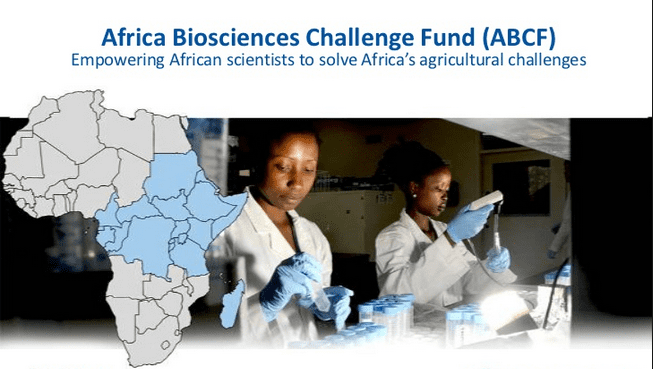Application Deadline: 30th June 2017.
The Biosciences eastern and central Africa – International Livestock Research Institute (BecA-ILRI) Hub, located in Nairobi, Kenya, is a shared agricultural research and biosciences platform that exists to increase access for African researchers to affordable, world-class research facilities. The mission of the BecA-ILRI Hub is Mobilizing Bioscience for Africa’s Development by providing a centre for excellence in agricultural biosciences, which enables research, capacity building and product incubation, conducted by scientists in Africa and for Africa, and empowers African institutions to harness innovations for regional impact. This mission is achieved by the BecA–ILRI Hub’s contributions to:
- Research: enabling research to harness the potential of the biosciences to contribute to increasing agricultural productivity and to improving food and nutritional safety and security.
- Education: contributing to the education and training of the next generation of African agricultural research leaders and scientists.
- Innovation: promoting the development, delivery and adoption of new technologies to address key agricultural productivity constraints.
The BecA-ILRI Hub capacity building program is branded The Africa Biosciences Challenge Fund (ABCF).The ABCF program operates in the critically important intersection between agricultural research for development (ARD), food security, and individual and institutional capacity building.
Areas of research
Applicants must be scientists affiliated (through employment) with African National Agricultural Research Systems (NARS) e.g. national agricultural research institutes and universities, and conducting research in the areas of food and nutritional security or food safety in Africa. Those carrying out research in the following areas are particularly encouraged to apply*;
- Improved control of priority livestock and fish diseases including: African Swine Fever (ASF); Contagious Bovine Pleuropneumonia (CBPP) and Contagious Caprine Pleuropneumonia (CCPP); Peste des Petits Ruminants (PPR); Rift Valley Fever (RVF); East Coast Fever (ECF); Capripox Virus diseases of ruminants;
- Harnessing genetic diversity for conservation, resistance to disease and improving productivity of crops and livestock and fish (livestock focus: African indigenous breeds, particularly goats, chickens, alternative small livestock species);
- Molecular breeding for important food security crops in Africa;
- Plant transformation to address food insecurity in Africa;
- Plant-microbe interactions;
- Tissue culture and virus indexing for production of virus-free planting materials in Africa;
- Orphan/underutilized species of crops and livestock
- Crop pests, pathogens and weed management research, including biological control;
- Microbial technology for improving adaptation of staple food crops and forages to biotic and abiotic stresses;
- Rapid diagnostics for crop, livestock and fish diseases;
- Genomics, bioinformatics and metagenomics including microbial discovery;
- Studies on climate-smart forage grasses and mixed livestock-crop systems;
- Microbial technology for improving adaptation of staple food crops and forages to biotic and abiotic stresses;
- Soil health in agricultural systems.
- Improved control of parasitic pathogens of plants (bacteria, fungi, oomycetes) that cause enormous economic losses as well as environmental damage in natural ecosystems (e.g.: Phytophthora infestans that causes potato blight).
Eligibility Requirements:
- National of a BecA-ILRI Hub target country for this call: Burundi, Central African Republic, Congo Brazzaville, Democratic Republic of the Congo, Equatorial Guinea, Eritrea, Gabon, Madagascar, São Tomé and Príncipe, Somalia, South Sudan and Sudan. Under special partnerships and collaborations arrangements, applicants from western and Southern Africa are considered for the fellowship. . The applicant MUST be a researcher employed within NARS.
- Currently engaged in research in food and nutritional security or food safety in Africa, or in a research area with relevance to agriculture in Africa.
- Good working knowledge of written and spoken English.
- Completed online application form.
- A signed letter of endorsement / nomination of the application from the head of the applicant’s home institute/organization/university faculty.
Applicants stand a higher chance of acceptance to the program if:
- They have own funding to fully support their research and all other costs while at the BecA-ILRI Hub, or
- They are able to secure a significant portion (at least 50%) of their total research budget and other necessary costs while at the BecA-ILRI Hub. In this case they would be seeking partial funding through application for an ABCF fellowship.
Benefits:
The BecA-ILRI Hub has secured funding to sponsor several fellowships on a highly competitive basis. The fellowship will cover the following costs[1];
- Research costs at the BecA-ILRI Hub;
- Travel;
- Medical insurance;
- Accommodation;
- A modest subsistence allowance;
- Cost of publication in open access journal.
Key Timelines
- For any inquiries / clarifications related to this call, please send an email to: abcfprogram (at) cgiar.org
- Closing date for applications: Applications will be accepted on an on-going basis until 30th June 2017.
- Notification to successful applicants and commencement of successful projects will be on continuing basis
Apply Now for the Africa Biosciences Challenge Fund (ABCF) – 2016 / 2017
For More Information:
Visit the Official Webpage of the Africa Biosciences Challenge Fund (ABCF) – 2016 / 2017

